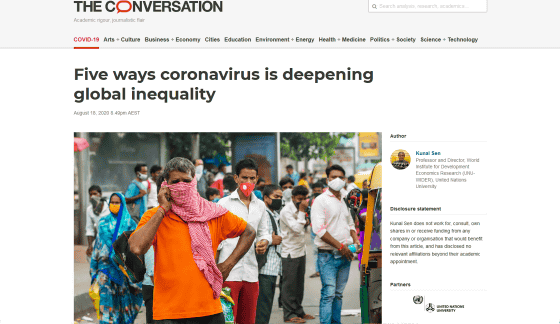Pointing out that the outbreak of the new coronavirus will increase inequality between countries

by
The pandemic of the new coronavirus is changing the lives of many, some of whom have lost work and learning opportunities. 'The pandemic is significantly increasing existing economic and social inequality in developing countries,' said Kunal Sen , director of the United Nations University Institute for World Development Economics (UNU-WIDER). Learn about the five areas in which viruses increase inequality.
Five ways coronavirus is deepening global inequality
https://theconversation.com/five-ways-coronavirus-is-deepening-global-inequality-144621

◆1: Work
'The pandemic has increased inequality among workers,' Sen said, citing urban blockades by governments to curb the viral epidemic, particularly to the poor in developing countries. Pointed out. For poorer workers, who depend on the daily wages earned by extraordinary work, the limited access to the workplace has resulted in significant income loss and livelihood insecurity.
And there are disparities among workers in the impact of the city blockade on work. For example, street vendors who sell vegetables and other vegetables in developing countries lost their job opportunities due to urban blockades, but high-income professionals who could work from home could continue to work and earn wages during urban blockades. It was Sen also argues that many poor people living in developing countries engage in informal jobs, lack adequate government protection, and lack social protection measures. I am.
◆2: Transition to digital environment
Pandemics are driving technological change, and some companies have created digital work environments that allow more people to work from home. In developed countries, where citizens have easy access to the Internet and are highly educated, the transition to a digital environment can benefit. On the other hand, in developing countries that do not have access to the digital environment and the Internet, the transition to the digital environment will not proceed even during the pandemic, and the gap with developed countries is expected to widen.

◆3: Gender gap
The city blockade forced both men and women to stay home, but women tend to spend more time doing housework and raising children than men, even if men and women stay home at the same time. It is also pointed out that women are more likely to engage in service industries that cannot work remotely than men, so they are more likely to lose their jobs due to city blockades.
In addition, there are fears that women will be forced to quit their jobs to raise children due to the closure of schools and childcare centers. In addition, when economic burdens increase in developing countries, daughters often do household chores instead of working mothers, so there is a risk of losing educational opportunities for female students due to a pandemic.
◆4: The rise of protectionism
Even before the epidemic of the new coronavirus, economic nationalism and protectionist movements that emphasize domestic labor and capital formation, such as the overheating of the trade war between the United States and China and the withdrawal of the UK from the EU, I was getting stronger. Sen said the trend was underscored by the pandemic, pointing out that rising protectionism in developed countries will widen the gap with developing countries.
When developed countries shift from free trade to protectionism, developing countries are locked out of the rich markets of developed countries and lose the opportunity to benefit from world trade. The global economy has been driving income growth in East Asian countries over the last few decades, but the pandemic's increasing trend of protectionism has limited its ability to close the gap between the rich and the poor after the pandemic. There is a possibility that you will end up.

◆5: Access to the vaccine
Vaccines against the novel coronavirus infectious disease (COVID-19) are necessary for countries to recover from the pandemic and recover economic activity. However, vaccine distribution is likely to be prioritized to developed countries that have invested heavily in research and development, and “access to vaccines” may further widen the gap between developed and developing countries. ..
Already in the early stages of the pandemic, part of the country is a movement to try to monopolize the medical supplies from the fact that has been observed, the possibility that the same movement even after the vaccine has been developed to occur there is plenty. If developed countries preferentially allocate medical supplies and vaccines to their citizens and reduce support to developing countries, it is believed that the human and economic costs borne by developing countries will increase.

How persistent the effects of pandemics on inequality depend on how governments in developing countries can act in concert, Sen said. Support for the poor, long-term education and investment in digital infrastructure, and support from the international community are important for closing the gap between developed and developing countries.
Related Posts:
in Note, Posted by log1h_ik






